The Childhood Struggles of Every Myers Briggs® Type
Did you ever feel misunderstood as a kid? Like once, or maybe constantly, people just didn’t “get you”? Unless you’re raised in a family of people who are very similar to you (and even that can create some issues) you’re likely to be misunderstood at one point or another, or often. Everyone feels misunderstood in a different way, and a lot of that can stem from your personality type and clashes with other personalities.
I’ve written this post in hopes that it can help families and friends to better understand each other and the unique struggles that each person faces, particularly in childhood. This post is reeeaally long so you can just scroll down to find your type or the type of someone you want to know more about.
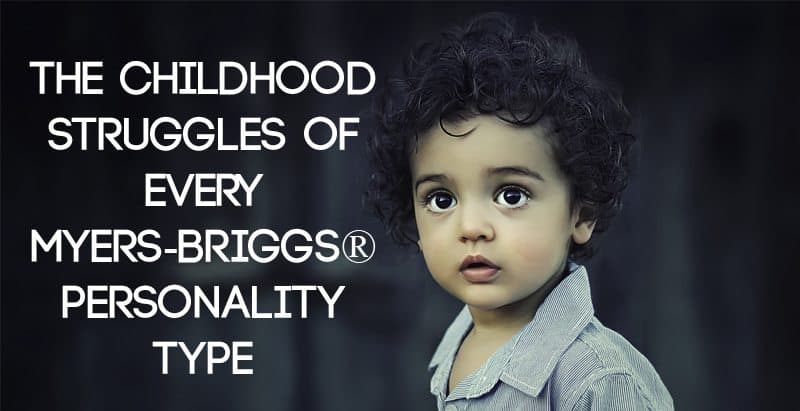
We’re going to start with the most common Myers-Briggs® personality types…
Not sure what your personality type is? Take our new personality questionnaire here. Or you can take the official MBTI® here.
The Defenders – SJ Types
The ESTJ Child
The ESTJ child is one of the most responsible, goal-oriented types around. No matter what birth placement they have, they are often ready and willing to keep the other kids in line and get things done. They love order and structure and are highly logical and fair-minded. They are practical children, who love to stay active and enjoy the company of others.
The unique childhood struggles of the ESTJ:
ESTJ children long for a life filled with friends and familiarity. They are very active and people-oriented and will find being cooped up at home excruciating when they’d rather be with friends. ESTJ children crave structure and order in their lives; they want their parents to be “the parent.” They will get frustrated if one parent is strict and one is lenient because they want things to be consistent.
One problem that can plague ESTJ children is that they aren’t naturally tactful or empathetic. They care very much about people, but can unintentionally hurt other children’s feelings with their lack of tact. Parents can help young ESTJs by modeling empathy and rephrasing insensitive comments to them.
ESTJ children long for approval and they are often very helpful in hopes of gaining approval. If parents don’t notice the ESTJs efforts, the child can become very depressed and feel worthless. An ESTJ’s sense of worth as a child comes largely from the approval of their parents and teachers.
ESTJs don’t like unexpected changes in plans or interruptions. New experiences can also be frightening for them. They like a consistent routine and to be surrounded by the familiar. Frequent moves, crises, or life changes can be very traumatic to young ESTJs who like to know what to expect and what lies ahead.
Read This: 5 Ways to Annoy an ESTJ
The ISTJ Child
ISTJ children are often quiet and serious but have a vast aptitude for intelligence. These highly responsible children are realistic, down-to-earth, and steady. They crave peace and quiet, but will often enjoy the company of one or two close friends. ISTJs are often very mature for their age and usually do very well in school.
The unique childhood struggles of the ISTJ:
ISTJ children like to know what to expect and when. They get very frustrated by unexpected changes, interruptions, or new environments they aren’t prepared for. When pushed into a new situation or environment, they can feel out of control and frightened. Likewise, jumping from one activity to another can be very stressful for them. They want a “heads up” about what’s coming so they can shift their focus and energy. They concentrate so completely on each task that being asked to all the sudden move onto something else, or to be interrupted, is very upsetting.
Like the ESTJ, ISTJs can unintentionally hurt other children’s feelings because they don’t immediately take other people’s feelings into consideration. If one of their close relationships is in turmoil because of something they said, this can cause them a lot of stress. Parents should try to model empathy and tactfulness for their ISTJ child, and rephrase insensitive comments back to them.
ISTJs crave a straightforward, consistent parent. A parent who is wishy-washy or a family where one parent is strict and one is lenient will be frustrating for them. They want rules and guidelines to be clear and logical, and they want their parents to be “the parent.” They want clear, explicit directions, and they want to know their parents mean what they say.
ISTJ children need a lot of time alone and hate to be pushed into social situations or constant time with others (even if it’s family). They often enjoy reading books, encyclopedias, and playing games. They’re very responsible children, so if you’re parenting one, try to reward them with increasing amounts of personal control as they get older. Show them that you appreciate their responsibility by rewarding it with trust.
Read This: 5 Ways to Annoy an ISTJ
The ESFJ Child
ESFJ children pair an aptitude for caring and sensitivity with a practical and realistic mindset. They long for love and appreciation; and like all SJ children, they crave structure, consistency, and familiarity. They adore their families and are very connected to their parents. ESFJ children are very affectionate and easily make friends and connections with others.
The unique childhood struggles of the ESFJ:
ESFJ children have a strong need for activity and socialization. They crave companionship and outlets for their energy, and if they’re paired with introverted parents they can often feel stifled or pushed aside. They also completely hate conflict, and it can cause them a huge amount of stress. Interpersonal tension makes them feel like their world is crumbling and they are easily overwhelmed by such things. As sensitive types, they can also easily feel left out or rejected. If parents aren’t very affectionate towards them or demonstrative of their love, their self-esteem can suffer greatly.
It’s common for ESFJ children to be natural worriers, and they can get stuck mulling over tragic events that could befall their friends or family members. Parents would be wise to reassure their children regularly of their love and that everything will be okay. These children want to know that their parents “have their back” and will be there for them no matter what. They can’t get enough hugs and cuddles and affirmation.
Discipline can be a stressful thing for an ESFJ child; loud, angry or sharp voices are extremely unsettling for them. They’re often quick to apologize, taking the blame even if they don’t understand what they did wrong. They just want to bring everything back to a harmonious level.
Like all SJ children, the unfamiliar is a scary place for ESFJs. If you’re parenting an ESFJ, try to preview new experiences for them, and relate things to familiar, past experiences. They also crave consistency, so be sure to follow through on your commitments and mean what you say. Wishy-washy parents are very frustrating to SJ children.
Read This: 5 Ways to Annoy an ESFJ
The ISFJ Child
ISFJ children are extremely loving, gentle and considerate. These quiet, thoughtful types long for close, nurturing relationships and a life that is secure and stable. These children long to be of service to others, and get a great deal of satisfaction from caring for others. They are very responsible and seek a harmonious life with their friends and family.
The unique childhood struggles of the ISFJ:
ISFJ children are very sensitive and gentle, and will find conflict-ridden environments extremely stressful. Confrontation of any kind is unsettling to them, and if they receive harsh discipline or shouting from a parent they can become highly distraught. They need things to be patiently and gently explained to them, and they need time to absorb the information.
ISFJs are often very shy around strangers, and this can be misinterpreted as disinterest or stiffness. They long for a few close friends, but can struggle with opening up to people or being confident enough to engage with others. This can leave them very lonely if their need for affirmation and friendship isn’t met. A parent can help by introducing them to other children to play with and acting as a helper for them to talk to other kids.
ISFJs want affirmation from their parents, they long to “belong” and feel secure in their family. If their parents aren’t very demonstrative of their love it can leave the young ISFJ feeling unloved. They may try to win their parents approval by serving more and doing more, and can then be left feeling tired and taken advantage of, or like nothing they do will ever be “good enough”.
ISFJs like a familiar, consistent routine in life. Unexpected changes like moving, family crises, or switching schools are very frightening and unsettling for them. They want to know what to expect, and how to prepare for what lies ahead. They also want a consistent parenting style, so wishy washy parenting can be frustrating for them. They also have a very keen awareness of what’s fair, and because they are so servant-hearted they risk being taken advantage of in the family. If you’re parenting an ISFJ, keep a close eye on what they do and make sure to thank them. If your other kids aren’t doing the same amount to help out, try to re-evaluate things to make sure everything is fair and your ISFJ isn’t getting burned out.
Related: The Childhood Struggles of ISFJs
The Adventurers – SP Types
The ESTP Child
ESTPs are full of excitement and energy; always on the go and eager to push the limits. These children are usually full of fun and laughter, making jokes and entertaining those around them. They are delightful, enthusiastic and adaptable. They make brilliant problem solvers and charismatic entertainers. They have huge reserves of energy and are usually daring and brave.
The unique childhood struggles of the ESTP:
ESTP children are extremely curious and impulsive, and have a hard time remembering or observing rules. They want to touch, taste, see, and smell everything. They probably get a lot more discipline than other types because they’re so impulsive and curious. They are often the recipients of exasperated parents anger, frustration, and potentially abuse. This can lead to a damaged self-esteem and feelings of frustration in young ESTPs. They require a lot of patience from parents, and do best with swift, consistent discipline that isn’t charged with anger. Many ESTPs recall being constantly spanked, hit, or yelled at as children because of their naturally impulsive, energetic personality. They respect discipline if it’s explained logically, calmly, and handled without the fury of anger.
ESTPs are very energetic, and have a hard time sitting still. They’re very distractable and aware of all that’s going on around them. School life is usually stressful and boring for ESTPs, who want to get up and “do” something. They are very intelligent children, but learn better in an active, hands-on environment. They probably feel like the life is draining out of them during long school days sitting at a desk. When they get home from school, it’s best to give them plenty of opportunities to get outside and run around and explore and move.
ESTPs are very blunt and even outrageous in their manner of speaking. They speak their minds without inhibition, but as a result sometimes say things they don’t really mean or unintentionally hurt others feelings. Because of this they can make and lose friends quickly, and may need some help learning tact and sensitivity from their parents.
Living in a very strict, confined, rigid household is very stressful for ESTPs who long to get out and be adventurous. Many times parents are so focused on the ESTPs moments of recklessness, that their contributions are sometimes ignored. If you’re parenting an ESTP, be attentive to their contributions and skills and reward them with more freedom and show them that you admire their energy, resourcefulness and zest for life.
Related: 5 Ways to Annoy an ESTP
The ISTP Child
ISTP children are highly independent, realistic children with incredible tactical abilities. They thrive in the physical world, where they can be adventurous and hands-on. They are logical and resourceful, but also generous and fun-loving children. They’ll love to get their hands on things and take them apart, put them together, and explore in a free, unrestricted environment.
The unique childhood struggles of the ISTP:
ISTPs, like all SP types, are driven by curiosity and a free spirit. They love to explore the world around them, seeing all that can be seen, and doing all that can be done. Being in a rigid, highly structured environment can be stressful for them because they want so much to be adventurous and to “do”. This also can create problems in school, where they are forced to sit still and concentrate for long periods of time. Listening isn’t the strongest skill of the ISTP, in fact prolonged listening is very difficult for them, so the school years tend to be very frustrating for them. They often are misdiagnosed, along with the other SP types, as having ADD or ADHD. Truly, they are ingenious in their skills and are highly intelligent; they just learn better through an active, hands-on lifestyle.
Growing up with Feeler type parents can be a blessing and a curse for ISTP children. While they enjoy the positivity and caring their parents provide, they can be confused by what they see as illogical, overly emotional behavior. If their parents try to explain things through feelings or emotion, it will only confuse and frustrate the young ISTP. This can also cause a problem in relationships, where an ISTP can unwittingly offend or insult other children and lose friendships. If you’re parenting an ISTP, it would be wise to model empathy and tactfulness, and help them understand other people’s feelings in a calm, logical way.
ISTPs are not naturally impressed or intimidated by people in authority; so a strict, authoritarian parent can be exasperating for them. They believe that respect should be earned, and don’t automatically grant respect based on “rank”. For this reason, ISTPS, along with most other SP children, often experience a lot of harsh discipline growing up. Unlike the SJs, who respect authority, SPs don’t understand why they should respect someone just because they’re older or bigger. This frequent discipline can eventually do great damage to their self esteem, or cause them to become harsh with others as they grow up.
ISTPs want to be trusted and allowed independence. As you see your ISTP child’s resourcefulness and are able to teach them the difference between risk taking and dangerous behaviors and being safe, you should allow them more independence and freedom. Trying to hold them back can result in a defiant attitude and potentially dangerous rebellion. ISTPs are very competent and adaptable and are often very good at taking care of themselves.
Related: Understanding ISTP “Laziness”
The ESFP Child
ESFP children are the quintessential entertainers. They love to laugh and make other people laugh; they are probably the most extroverted of all the types, craving human connection constantly. They are down-to-earth, energetic children full of fun and enthusiasm. They live for the moment and are joyful optimists.
The unique childhood struggles of the ESFP:
ESFPs, like all SPs, live on impulse. Because of this they hate to have to wait around or sit still for very long. They have an abundance of energy, so school and being forced to sit still so long each day can prove quite frustrating to them. They are often misdiagnosed with ADD or ADHD because they find sitting still so aggravating. For this reason they usually dislike school, other than the social aspect. They can be quite intelligent, but like all other SPs, they learn better in an active, kinesthetic learning environment.
The ESFP living-for-the-moment mentality also means they can find rules and a rigid schedule very frustrating. They are very impulsive, so they often forget rules in favor of how they feel ‘right now’. This can land them in a lot of scrapes as children, and they can get disciplined much more than other types. ESFPs really crave approval and affection, so discipline that is done in anger (harsh spankings, yelling, etc,.) can be very damaging to their self-esteem and they can wind up feeling like they never do anything right.
ESFPs love being around people, and will find being cooped up in the house upsetting. They want to go out and have fun with everyone else, and interact. They love to get reactions out of people and as kids can be loud and get right up in people’s faces in their animation and exuberance. This can be great if their parents are a similar type, but this can also frustrate a lot of parents and the excitable young ESFPs can be constantly told to “be quiet”, and to “sit still” which leaves them with an abundance of bottled up energy. Getting these children involved in sports or the arts (dancing, music, drama) can be a great way for them to use their energy and express their sensory entertaining side.
Related: The Top 7 Gift Ideas for ESFPs
The ISFP Child
ISFP children are gentle free-spirits who are easy-going and compassionate. They are highly sensitive and often have a knack for art, music and style. They love beauty, and have a desire to make beautiful things. They care deeply for their families and friends and live to make the best of each moment.
The unique childhood struggles of the ISFP:
ISFPs are highly sensitive and easily get hurt feelings as children; yelling, spankings, or criticism of any kind can make them feel very vulnerable and stressed. They want lots of snuggles, cuddles and approval, and if they don’t receive it as children it can make them feel very insecure and sad. However, at heart, like all SPs, ISFPs are optimists, and will try to look at what is positive in their lives.
ISFPs are extremely sensory, and love to touch and feel everything. They also are somewhat impulsive, and rules are easily forgotten. For this reason they can face a lot of discipline and they take that very hard. They also can feel stifled in an environment that is highly structured and rigid; they like to have a low-key lifestyle without a lot of demands on their time.
ISFPs usually love TV and videogames, and find school to often be boring and frustrating. Although they want to please their parents and teachers, they have a tendency to underachieve. They tend to only place importance on the practical and immediate needs, and often feel misunderstood or looked over in school settings. They can also face parents who are less than pleased with their academic performance or their personal pursuits. They may feel that they are never “good enough” to please the people most important to them. ISFPs can be highly intelligent, but learn best in a hands-on, active learning environment.
ISFPs struggle with planning ahead; they live in the moment, like other SPs and are better at being adaptable. For this reason, long detailed projects and tasks are overwhelming for them. Parents of ISFP children could help by breaking down projects for them into workable segments so that they don’t get as overwhelmed.
ISFPs need approval and support growing up; otherwise life is a scary and formidable experience. They care very much what other people think of them, and will often spend a great deal of time choosing the right clothes or brushing their teeth. They want to make a good impression on others, and because they are so sensory by nature, the way they look matters a lot to them. Don’t confuse this with vanity, ISFPs have a great understanding of beauty and like to incorporate that part of their personality into their dress.
ISFPs are very sensitive and will have a hard time dealing with conflict of any kind. When faced with hurt feelings, they may become very dramatic and misread things entirely. They may jump to conclusions and feel like someone hates them who merely disagrees with them. They have a tendency to hold grudges; and can use a lot of help from parents in learning to manage their emotions and not take things so hard.
Related: 5 Ways to Annoy an ISFP
The Dreamers – NF Types
The ENFJ Child
ENFJ children are sunny and enthusiastic, blending creativity and warmth in an unforgettable way. They are highly sociable little children, loving to make others happy and striving for harmony in all their relationships. They, like all NF types, have a very strong belief system that they hold very dear. They are expressive and thoughtful; often very popular with other kids. Like all NF types, ENFJ children are highly imaginative and prone to daydreaming.
The unique childhood struggles of the ENFJ:
ENFJ children are highly sociable and get much energy from being around people. Being alone or cooped up in the house will be excruciating for these types. For this reason, if they’re part of a more introverted family they can feel that their needs aren’t met; or if they are met, they can spend so much time shuttling from one activity to another that it exhausts them.
ENFJs so much want to make others happy and are so afraid of hurting anyone’s feelings, that they may make decisions that aren’t in their best interests and suffer for it later. As they get older, they will need help learning how to be true to themselves even if it means disrupting the harmony of everyone else sometimes. They are so sensitive to the moods and feelings of others, that they absorb them into themselves. Conflict and distress in the lives of others will be absorbed by the ENFJ and it’s almost as if they are feeling the distress of others deep within themselves. Things like divorce in the family, death of a loved one, or any kind of conflict is taken very hard by these highly sensitive types.
ENFJ children are very affectionate and love to express their feelings freely. They will want to hug and cuddle with their friends and family members, but our culture sends strong messages about this affection being inappropriate. Because ENFJs are very concerned with being true to their hearts, they may feel they have to stifle a part of themselves to “fit in” to American culture and not be as affectionate and expressive as they naturally are.
ENFJs are extremely sensitive to criticism; and negative words have a deep impact on them. They take criticism extremely personally, and as a result, can feel sometimes that their families or loved ones don’t really love them after a dispute. They idealize their relationships and can feel tormented with ideas of abandonment when they are criticized. It would be wise for parents of ENFJs to frequently express their unchanging love for their child; especially before a punishment or criticism.
Related: 5 Ways to Annoy an ENFJ
The INFJ Child
INFJ children are dreamers in every sense of the word. They are highly imaginative and creative, and also very private and protective of their inner worlds. They are often quiet, gentle and sensitive, but if one of their values is questioned they can instantly become fiery, passionate and (sometimes) stubborn. They are very intellectual and empathetic, concerned with the world and everyone in it. They are always looking to understand the meaning of everything that touches their lives; feeling that it is all connected somehow.
The unique childhood struggles of the INFJ:
INFJs live inside a rich inner world. They thrive on the ability to use their imagination, to analyze, and to ponder. For this reason, things like interruptions, being part of a more extroverted family, or sudden changes in plans can greatly upset them. They get so caught up in their thoughts that to be interrupted or pulled in a different direction is very stressful for them. This may also make it harder for them to concentrate on projects that don’t fall in line with their inner world; and although they want to please their teachers, they can often struggle with the more rote aspects of school.
INFJs are often very shy as children; but also very much want to be liked or to have one or two very close friends. They can often have a hard time making friends because of their intensely private natures; although they are usually well-liked by their peers because of their warmth and sincerity.
INFJs derive strength and nourishment from being able to spend time alone daydreaming. This is often suppressed by parents and the world, who are more concerned with “getting things done”. However, this isn’t just a desire for an INFJ, it’s a need. Their dominant function is introverted intuition, which is often accessed through ‘daydreaming’, and without being able to use it they can feel a huge amount of stress; as anyone does when they can’t regularly access their dominant function. Imagine how damaging it would be to tell an ESFJ (the most common type in females) to not care about other people’s feelings anymore. Because many can’t see the practical purpose of introverted intuition (plenty of people can see the practical purpose of caring about feelings or thinking logically) INFJs are often told to get out of their heads, stop daydreaming, and get to work on the sensory aspects of life. For this reason, the use of their dominant function is often stifled during childhood. They make up only 1-2% of the population, and because of a lack of understanding can often grow up feeling misunderstood, and forced into a box that just doesn’t “fit them”.
If you’re parenting an INFJ, try to make sure you give your child plenty of time to think and daydream. Try to protect them from a demanding and high-speed world by creating private times and places they can go to be alone. It’s best not to interrupt an INFJ when they’re working on a project or thinking hard about something (unless you have to). Their mind is so busy making connections and so focused on their idea that, when interrupted, it feels to them like all their finely tuned internal pieces have just been scattered everywhere. They can lose interest in the project altogether and become very frustrated. They are perfectionists as well, and hold themselves to such a high standard that they can get frustrated easily while trying to perfect their projects and ideas.
INFJs intensely hate conflict; like all extraverted feelers, they absorb others emotions within themselves. They greatly desire harmony in their outer world, and if someone is stressed or unhappy they will feel it inside and do whatever they can to make things harmonious again. For this reason, divorce, fighting, or any kind of anger is taken very hard by them. They also take criticism very personally, and can often feel insecure in a family where their feelings aren’t handled carefully by those around them.
INFJ children have a hard time understanding their own emotions, but can easily pick up on other people’s emotions. For this reason, they can easily get overwhelmed or confused about how they feel. Along with INTJs, INFJs are the most likely to experience health problems as a result of internalizing stress and emotions.
Related: The Struggles of Being an INFJ Child
The ENFP Child
ENFP children are some of the most enthusiastic and insatiably curious of all the types. They constantly dream of what is possible, and are overflowing with ideas and energy. They are very sensitive and imaginative, wanting to share all their thoughts and dreams with the world. They are eager to make friends and connect with others. They have an adventurous spirit; longing to explore the world and new environments.
The unique childhood struggles of the ENFP:
Focus and concentration don’t come easily to most ENFPs. They are so full of ideas and possibilities, that they often get lost in a trail of thoughts. This makes school often frustrating for them, where they are forced to sit still and concentrate on one task at a time. Their enthusiasm for every possibility also means they can take on more projects than they can realistically finish, which can lead to them being overwhelmed. They have a playful, boisterous enthusiasm that makes them endearing children, but can lend itself to trouble in school.
ENFPs as children often have trouble with self-discipline and can procrastinate, leaving important tasks till the last minute. This can breed a sort of chaos around them that can be overwhelming to them and those who live with them. Parents should try to offer gentle reminders, early in the process, in a private and encouraging manner to help them keep on task with their endeavors. However, as they get older, it’s wise to let ENFPs learn to rescue themselves and form their own way of managing projects.
ENFPs are on the sensitive side as children. They easily get their feelings hurt, and can often fall into depression. In public they may seem as enthusiastic, playful and active as ever, but in private they can be quite worried, depressed, and fearful. They are prone to self-blame and bouts of depression, and could use gentle encouragement from parents regularly of their love and acceptance. They are very empathetic children and will stand up for other kids who are bullied or lonely.
ENFPs long very much to be able to express their thoughts and ideas; and if they’re raised in a more Sensor/Judger type environment, they can often feel stifled and misunderstood. Sensors may not see the point in the ENFPs theoretical ideas or abstract ramblings, and can cut them off short, or label them as “flighty”. ENFP children are very intelligent and insightful, but are often cast aside as “ditzy” or “dreamy” by parents who don’t share the same nature.
Read This: 10 Things That Terrify ENFPs
The INFP Child
INFP children are some of the most intensely private and deeply passionate of all the types. On the surface they may seem cool and reserved, but inside they have an intensity of feeling and strongly held values. They are quiet, serious and highly sensitive children who deeply care about those close to them. They usually have a rich fantasy life and are naturally creative. They strongly desire to understand the meaning of life and love to express themselves in artistic ways; through music, writing, poetry, dance, or theater.
The unique childhood struggles of the INFP:
INFP children are highly sensitive and live life with a certain emotional vulnerability. They are easily hurt by real or perceived insensitivity, and they can struggle with irrational fears in response to this. They can feel insecure and as if they are betrayed by those they hold dear. In order to protect themselves, they have a tendency to hold grudges and have a hard time forgiving and forgetting. They are introverted feelers, which means they are very aware of their own feelings; but have a harder time understanding feelings that are foreign to them. While they are empathetic and compassionate individuals, they may not be able to separate constructive criticism from actual dislike. They may take discipline very hard as a result and they may be hurt by things that weren’t intended to be hurtful. It is important that parents remind the young INFP that they are loved and accepted for who they are, and that criticism does not mean dislike.
INFP children quickly become bored with routine and a rigid structure. They like to mix work and play, and may often have half-finished projects that are abandoned when something new comes along. They are so drawn to alternative paths of discovery that they can struggle with meeting deadlines for homework and can have a hard time staying on task in school. They can get very frustrated and overwhelmed by a world that naturally is more in tune with a sensor/judger-type mindset.
Because INFPs are so internally focused and thoughtful, they aren’t always very aware of what’s going on around them unless it involves someone or something that is personally meaningful to them. They can frequently forget things like homework, or their backpacks. This may also lend itself to the INFP being somewhat clumsy and awkward. Some INFPs do excel at athletics; but it is usually because they have made this something personally meaningful to them and given it great attention.
INFP children long for harmony and good-will in their family; and will become very distressed if there is conflict. They may cry easily as children, and because they are so private feel very embarrassed by this outward display of emotion. Male INFPs in particular often face scrutiny or bullying for their sensitivity and emotional nature. Parents of INFPs would be wise to encourage their children, and to accept them how they are; let them know their feelings are perfectly normal and that you accept them just how they are.
INFP children are easily distracted, and often have to be reminded to finish things. They are so internally focused that if they’re feeling upset, worried, or have their minds on anything else they may not even hear what’s going on around them. Their feelings are the loudest thing they hear. They care very deeply about others, but can struggle with getting out of their own heads or their own feelings to reach out to others. That said, they are excellent listeners when engaged in one-on-one conversation and can listen intentionally much longer than many of the other types can.
Related: The Struggles of Being an INFP Child
The Investigators – NT Types
The ENTJ Child
ENTJ children are fiercely independent, logical, strong-willed and ambitious. They are driven by intellectual curiosity and a need to master everything they try. These creative and inventive children are full of energy, excitement and challenge. They are born leaders, and instinctually see ways of getting things done and have great energy for accomplishing tasks. They are extremely determined and outspoken with a great amount of self-confidence.
The unique childhood struggles of the ENTJ
ENTJs rely intensely on their logic and thinking; because of this they are very uncomfortable with the world of feelings and emotions. They hate to cry and will do whatever possible to not seem vulnerable. Because of this, during moments where their emotions show, they can feel intense shame afterwards. Having a parent who can help them understand that these emotions are normal and not something to be ashamed of is essential; it’s also wise to not fuss over them when they’re in an emotional state, because this will only make them feel more humiliated. This same discomfort with feelings means that they can be unintentionally insensitive to others frequently growing up; hurting feelings or coming across as a know-it-all or judgmental. Parents would be wise to model empathy and tactfulness for ENTJ children, and to rephrase insensitive comments back to them.
ENTJs always crave a challenge, and are highly ambitious. Because of this they can often “bite off more than they can chew” and get overwhelmed with a huge amount of obligations and responsibilities. They don’t like to accept help with their projects either, because that would make it impossible for them to enjoy the pride of accomplishing something on their own.
ENTJs long for more and more freedom and independence. They are so self-determined that they long to have complete control of their environment. While this can be a wonderful thing for them; they rise to any challenge you place before them, it can also mean they grow up too quickly and don’t enjoy the beautiful innocence and experiences of childhood. This yearning for control can also cause them to butt heads with their parents over rules and responsibilities they see as trivial.
Related: 5 Ways to Annoy an ENTJ
The INTJ Child
INTJ children are highly creative and intellectual, yearning to understand the truth of the universe. These quiet, serious children are intensely curious about why things are the way they are, and they long for logic and truth in everything they do. They have a rich inner life and love the fantasy and scientific world, learning as much as possible about things that interest them.
The unique childhood struggles of the INTJ
INTJ children, along with INFJs, have a low threshold for outside stimulation. In order for them to think clearly and be at peace, they need things to be quiet and peaceful. While others may think they are wasting time daydreaming, this quiet time inside their own mind is often spent conceiving their most ingenious thoughts and ideas. Having to be forced out of their minds into an extroverted world, or by cause of interruption, is highly frustrating to them. They need to be allowed privacy and solitude to thrive.
INTJ children can be quite independent and stubborn, and often struggle with respecting an authority unless they feel that respect has been earned. They are rarely persuaded to do things they don’t want to do, or don’t believe in. This can lead to them butting heads with a parent or authority figure. They respect others who earn their respect using honesty and truth and logic; not rank or age. They have a strong sense of what is fair and don’t hesitate from putting up a fight if they feel they have been unfairly accused or misjudged. They also have such a strong need to be right that they can have a hard time backing down from an argument or admitting a mistake. Because of their strong independent nature, parents of INTJs would be wise to give them a lot of responsibility, and opportunities to prove they can take care of themselves. Explain the basic parameters of what is needed or expected, and then allow them to determine how to live independently in those lines.
INTJ children are so internally focused on their thoughts and ideas, that they don’t care too much about “fitting in” with society as a whole. Because of this, they can often seem aloof or uncaring and may have a hard time gracefully navigating through the complicated waters of human interaction. They can care very deeply about their loved ones, but aren’t prone to be very demonstrative of their love. They may end up being berated by more feeling-type parents for their lack of social graces or because they weren’t nice enough to “dear old Aunt Lucy”. This can be a frustrating experience for INTJs who don’t see the practical purpose of small talk, social niceties, and pretending to be something they’re not.
Read This: The Childhood Struggles of INTJs
The ENTP Child
ENTPs are friendly, energetic children who are driven by their imagination and curiosity towards anything new, different, and exciting. They are driven to be innovative and are often full of fun and good humor. They have a natural charm and cleverness that shows itself through their storytelling ability, clever puns, and engaging presence. They are very spirited and insightful, and enjoy debating with others to get to the truth of any matter.
The unique childhood struggles of the ENTP
ENTP children are naturally skeptical and are rarely convinced of anything without rational reasoning or logical consequences. They are very opinionated and can be argumentative, which can lead them to being called bossy or arrogant. They often feel misunderstood in this; in their minds they are merely trying to point out an inconsistency and can’t stand to see a flaw in any position or argument. This may cause them to butt heads with other children, teachers, or their parents.
ENTPs may seem messy or disorganized, and they have a hard time following through on all their commitments. They love to stay open to new ideas and to be adaptable, and so they resist structure and limits. This can cause great frustration to them and their parents, when they are constantly having to rush to get a project done or be told over and over again to keep their room clean. ENTP parents should remember that ENTPs can be highly inventive in a state of perceived “chaos”, and possibly allow them a little space for disorder.
ENTPs are very sociable and outgoing, and will get frustrated being cooped up at home. They love to have an audience, and love a good pair of listening ears for all their ideas and plans. They are often very popular for their imagination and optimism. ENTPs are independent children who are very anxious to get on their own two feet and to be in control of their lives. They may push for bedtimes to be later, and more freedom to go places and experience things. If they live under very strict parents they can feel stifled and disrespected because of the lack of freedom. They greatly desire to be seen as competent, so being treated their age can be very irritating to them.
Related: ENTP Spotlight on Walt Disney
The INTP Child
INTPs are one of the most intensely curious of all the children. They are driven by a need to understand the world, and are extremely independent and strong-willed. They are incredibly logical and matter-of-fact, and are very skeptical of established facts or theories. They love to question and explore alternatives, and often have original, ingenious ideas. They are adaptable and easy-going, and usually have a fun, offbeat sense of humor.
The unique childhood struggles of the INTP
INTPS are natural skeptics, who are driven by a need for logic and truth. Because of this, they have a naturally argumentative style that is often at odds with their parents authority. They question everything, and with very strict parents can often feel stifled and held down. For them, as with the other NT types, respect needs to be earned, not automatically given. They don’t mind disagreeing with an authority figure if they see something that doesn’t make logical sense. Because of this, they can end up getting frequently punished because the parent sees them as being disrespectful to their authority. This can be quite frustrating for the INTP child who just wants to get to the truth of the matter at hand.
INTPs see many possibilities and ideas everywhere, and in school find it hard to stay focused. They hate the repetition and routine, and want a steep learning curve. They are usually highly intelligent, and don’t care that much about grades or what their teachers think of them. They are usually much more intelligent than their teachers are aware of, because they don’t feel the need to “prove” their intelligence. They may get so bored during school that they scribble down answers without thinking, and get poor grades as a result. In their minds they have more important things to be thinking about than the same sums day after day after day. This can lead to problems at school or at home, with parents or teachers who judge the child as incompetent or lazy. Parents of INTPs do best to pay attention to what areas of interest their child has, and to encourage and support their child in pursuit of that interest or goal. They can learn quite a lot by discovering all there is to know about an interest they have.
INTPs are easily overwhelmed by too much noise and talking. They live life primarily inside their own heads, and find noise and lecturing a constant interruption. Because they are so internal, they can often come across as clumsy or slow. They really aren’t slow, but each time they are asked to engage they have to forcefully pull themselves out of their own thoughts and ideas. Too much noise or sensory stimulation is overwhelming for them, and as very young children can display tantrums in reaction to sensory overload. They may bury their heads in a pillow and scream or just isolate themselves from all noise.
One major issue that INTPs deal with is that they think through things logically, and without a lot of emotion or feeling. They find themselves confused by other people’s feelings and emotions, and have a hard time understanding social niceties. They are often misunderstood because of this and reprimanded for not using manners or engaging in small talk. This can be very frustrating for them.
One sad fact is that INTPs are often misconstrued as having autism or aspergers. The world often doesn’t see how insightful and intelligent these children are, and merely tries to force them into a mold that is more “normal”. There’s a possibility that INTPs are more likely than other types to live with aspergers or autism, but so far my research has been inconclusive on this.
Read This: Understanding INTP Thinking
In Conclusion
I know this has been a really long post to read! I probably should have made it into an ebook instead of a post, but either way I hope it was helpful! Please let me know what your thoughts are in the comments!
Find out more about your personality type in our eBooks, Discovering You: Unlocking the Power of Personality Type, The INFJ – Understanding the Mystic, The INFP – Understanding the Dreamer, and The INTJ – Understanding the Strategist. You can also connect with me via Facebook, Instagram, or Twitter!
Sources:
Gifts Differing: Understanding Personality Type
Nurture by Nature: Understand Your Child’s Personality Type – And Become a Better Parent
Type Talk: The 16 Personality Types That Determine How We Live, Love, and Work
The 16 Personality Types: Profiles, Theory, & Type Development
The INTP: Personality, Careers, Relationships, & the Quest for Truth and Meaning
Get Your Free eBook!

Subscribe to our newsletter and get an eBook packed with powerful parenting tips for each personality type! Enjoy 28 beautifully illustrated pages exploring the needs and strengths of all 16 personality types in childhood.


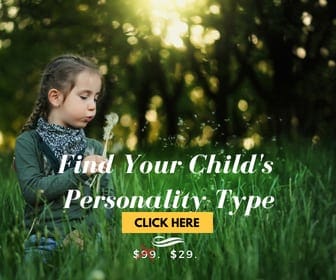
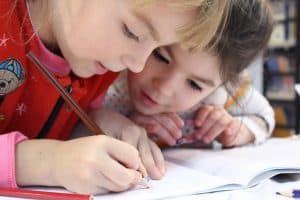
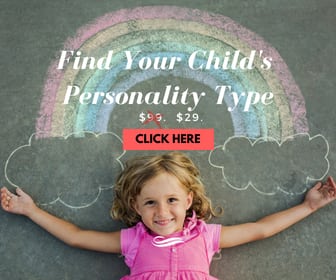

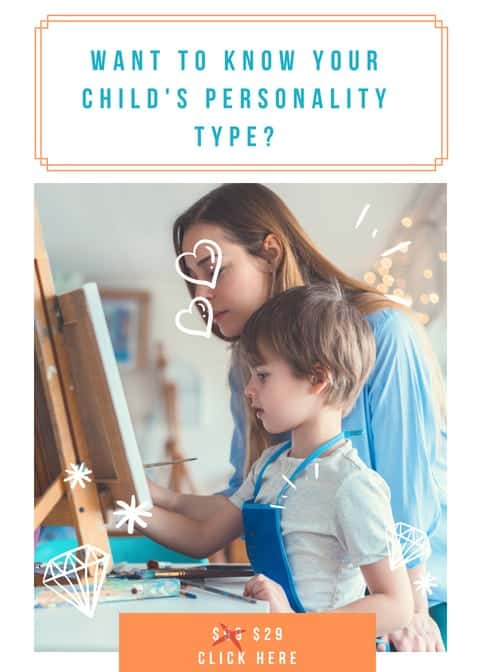

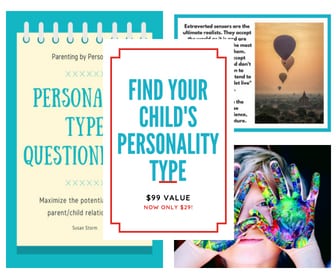


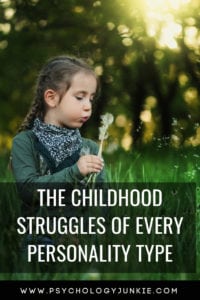











Spot on for me.
Thanks for the feedback! 🙂
You’re very welcome. 🙂
Very interesting article, Susan. Funny thing is, I could identify with three different types here: INFJ, INFP, and INTP, and the problems were spot on.
I always end up having the same problem! And then I re-evaluate whether I truly am an INFJ, and then always end up coming back to the conclusion that I am. I think there are a lot of similarities between the N types though; a certain set of issues that they all identify with to some extent maybe. I definitely identified with both INFP and INFJ and even a lot of the ISFJ tendencies; not all though.
reading these makes me so sad that parents aren’t given (or don’t seek!) this information in relation to their children! everything you wrote about the ENFJ child rang so true to me, and I can’t help but wonder how much more appreciated and loved I could have felt as a child had my parents known these basic things!!
I know for certain that I will pay attention to my children’s typologies even as they shift, because it really does not have to be such a mystery to figure out how best to care for one another.
I’d consider Myers-Brigg the closest thing we get to children “coming with a manual” 😉 great read!
Thanks so much for the feedback! I would completely agree that childhood would be easier for SO many more people if parents knew the MBTI. Truthfully though, even if they didn’t know MBTI, just realizing that people are all made differently/have different strengths, weaknesses, etc,…would make life a lot easier for so many people. Learning more about the MBTI has helped me to understand my kids SO much better…even if I don’t 100% know their types for sure yet (it’s hard with kids) I can be more open to what others might see as “non-conformities”. Anyway, thanks again! Glad to have an ENFJ on my blog! 🙂
I’m an ESTJ and that is spot on. I also have an ISTP husband and two young children – a 4-year-old ESFJ and a six-year-old who is either an ENTJ or INTJ. This is so accurate for both of them. It’s heartening to know that we’re doing a lot of the right stuff. We probably have too much conflict for the lone F, but she’ll survive. She knows she is loved.
Thank you! So nice to have an ESTJ here! My husband is also an ISTP, and I have an ESFP step-son and (I believe) an INTP daughter. The one-year-old is too hard to type yet:) I’m sure your ESFJ six-year-old will do just fine; from my experience, ESFJs are tough cookies who are usually pretty resilient. Thanks for visiting my blog! I’d love to get your input on other posts in the future if you ever see anything else you like/don’t like here 🙂
I’m an INTP. I wish parents were taught this. I was always very curious as a child. I’m constantly told how I once snuck to the blinds and was reprimanded by my mother to not play with them or the strings. Yet the moment she went to cook, I was back at it. She says I was much too quiet and when she checked on me, I was standing on my tiptoes, tangled in the blinds with them and the string around my neck, atop the couch. Which is a really scary thought. I was so curious, I put myself in grave danger to figure out how the darn blinds worked. I’m even told how I woke from a nap, and my babysitter came in and found I had superglued my mouth shut and fingers together. And I also was found cutting my hands up with a shaving razor during bath time, and didn’t make a single sound as I tried to figure out how to use it until I was caught red handed. Then, all throughout middle school, despite getting great grades, I got constant phonecalls home for arguing with the teacher. I was really just questioning her reasons for the things she ordered or said, and it was taken as questioning her authority and disrespecting her.
I am really sorry you had to deal with all that! I have an INTP daughter and she is the same way. Always very curious, and asks a lot of questions – it can seem combative or argumentative, but she really just wants to know the core truth of an idea and figure out all the in’s and outs of how it works. I’m glad you survived your childhood! I think all parents would benefit from knowing about MBTI. Thank you so much for your feedback!
Hi Susan 🙂 I really love your blog. I especially liked this article because, as an INFP, it really rang true for me. I learned about Myers Briggs when my kids were quite young and it really helped me to know how to talk to them about the issues they were facing. I am a part-time teacher and the MBTI helps me to understand and relate to the kids who are more difficult to deal with in a classroom setting. Recently, i have started writing and illustrating a series of fairy tales based on the 16 personality types. So far I have published three (INFP, ESFP, and ISTJ) on my blog. If you have time, I would love you to take a quick look and let me know what you think. I hope they are true to type. I want to emphasize the positive qualities of each type, so if a child of that type is reading the story, they feel validated by sharing personality traits with the protagonist. Someone suggested that my INTJ character could be an evil genius. I’m okay with the genius but I don’t want to suggest to any INTJ child that their personality is inherently evil. Anyway, please take a look if you are interested and thanks for all the interesting posts. https://mariebanville.wordpress.com/
Thank you so much for your feedback! I am so excited to hear that you are using MBTI to help in teaching – I would love to know more about how it has helped. I would absolutely LOVE to read your fairy tales! That sounds so fun 🙂 I will check them out as soon as I get a spare moment to really give them my full attention, and then I will let you know what I think. I’m sure they are amazing. I’m glad you aren’t going for the evil genius INTJ thing – I think that stereotype is a little worn out. I’m sure you can think of something better. I’m very much looking forward to checking out your blog, and thanks again! I would love to get your thoughts in the future, it is so helpful.
Hello again, Susan. I am thrilled that you will read my fairy tales when you have time. I have had mostly positive feedback on the MBTI forums. I did let my students read them if they were interested and a few of them identified with the types. At the beginning of the school year I generally do a short unit on Getting to Know You” and the online MBTI test is one of the activities. Most kids are interested and they especially like knowing the famous people who are the same type. Since kids are still developing and the online tests are not 100% accurate, their types give me just a general idea of who they are. It is interesting, however, how a class that might have more SPs is very different from a predominantly SJ class. The NTs and NFs tend to be rare. Of course, as an INFP it is delightful to occasionally teach an INFP or INFJ child.
(ENTP) This was fantastic. Insightful and accurate. I’m going to share it with my husband for help in parenting our kids and also because he as an ISFJ had some really unfortunate childhood experiences. Thank you for your time and care.
Thank you so much for your feedback! I am so glad that this was helpful to you, and I hope it will be a help to your ISFJ husband. I really enjoyed doing the research, and am thrilled to know it’s being of any use. IF you ever come across any new insights on the subject I’d love to hear them! Thanks again!
Interesting! I found this very true for my type, INTP. (The following is supplementary information: female.) My best friend is an INTP and he has high functioning autism, so I suppose that could be a somewhat accurate assumption. I have ADHD, so, yeah. I did always seem really stupid in front of this one girl when I was younger, because a lot of what I would say made sense to me and me only since I spent so much time in my head, so that part was true for me, too.
Thanks so much for your feedback! I know INTPs often have a tough time of it in childhood because there aren’t that many of them (especially females!) My daughter, I believe, is an INTP so I’ve dedicated a lot of time to learning about that personality type. Thanks so much for giving me your ideas about the post 🙂
THIS! I wish I had read this years ago. I’m an INTP always accused of being disrespectful. It is SO FRUSTRATING- to simply be yourself and try to have a conversation, but be told that you’re disrespectful to the very people you respect which is why you “argue” with them in the first place! I never understood why people were saying that- EVER. And I’m an adult now. Please keep blogging. I implore you on behalf of all INTPs. We need other people’s feelings explained logically. I get it now. Doesn’t mean I can change who I am, but at least I understand- and as INTPs will agree, it’s all about understanding.
Thank you so much for your feedback!! I can imagine it’s got to be EXTREMELY frustating to be misunderstood in that way. My daughter, I believe, is an INTP and she runs into this problem herself so I’ve tried to understand as much as I can about the INTP type so I can be a better parent and more encouraging to her. Thanks again for your comment, it means a lot to me! So glad this post was helpful to you! 🙂
Your daughter is very lucky to have you! It’s so wonderful that you’re trying to understand her better and adjust your parenting style to fit her needs. Growing up as an INTP female comes with a unique set of challenges (and if you have any questions- feel free to ask), but it sounds like she will flourish with your patience and encouragement. Best wishes to both of you. 🙂
Thank you so much!! That means a lot to me!
This was amazing! It was like reliving my childhood as an INFP/INFJ and realizing why I reacted to things the way I did or do. Do you know of a simple test for small children? I know my son is an Extrovert, but I often wonder which one..
I’m so glad this was helpful to you! Unfortunately, I don’t know a good test for children. I’ve tried to find one myself, but it’s hard! I’ve come to the conclusion after researching it that it’s better to wait to type kids till they’re at least in their teens just because their cognitive functions haven’t developed enough yet where we can truly see their type. I mean you can estimate and make predictions, but it’s hard to get a good 100% certain type when they’re still young and their functions are relatively out of balance. Sorry if that wasn’t very helpful!
I have found this kids questionnaire helpful:)
http://www.personalitypage.com/html/pqk_indicate.html
Hi….I found this post very interesting and when I read it I found that all the things are so true for me.
I’m an 15 years old INTJ currently in high school.
Yes…It’s true I just cannot bear authority for their age or rank. I completely dislike highly structured environment and hate blind traditions and rule.
Due to my seemingly arrogant behaviour I didn’t really had much friends in my childhood and in middle school but I don’t care about it. I’m quit happy with few friends and they are very close to me and very caring too.
However all of them passed my secret test.
I have a nice sister too with ESFP MBTI type.
She is quite entertaining and knows how to make me smile.
My parents now started to understand me slowly slowly although I never expressed my feelings but I constantly demand solitude and independence for me. Thats correct.
It’s a really very nice blog even I wrote about MBTI types along with my physics writings in my school’s monthly magazine regulerly.
This is nice post overall and quite accurate!
Thank you so much for your input! I really appreciate it. I am glad you have some good friends now – I definitely believe it’s about the quality of your friends and not the quantity. I’d rather have one good friend than lots of sort-of friends 🙂 I’m glad your parents are starting to understand you better too. I know that childhood for an INTJ can be tough! Thank you again for your encouragement, I really appreciate it.
Found this comment from a 15 year old delightful and amusing after reading this extremely good article about MBTI children. I am also an INTJ and as a child (and still to this day at 40) my struggle was always with frustration over being completely misunderstood. Most of the energy I have expended in my life has been to be helpful to others, to reach out and do things for them, but when I do I get very negative reactions. As a child my constant complaint to my mother was “Nobody likes me.” I felt that the universe was torturously unfair because of this. The above comment is like seeing myself from the outside. First, our young friend bothering to post a comment at all is a big reaching out from an INTJ and a massive compliment. INTJ’s just ignore anything unworthy and it takes so much effort to be social even in a limited way (like posting) that we save this kind of effort only for those whom we admire. Second, our friend comes off as somewhat pedantic and even a little know-it-all for going through and checking off each paragraph of the INTJ section, letting you know it’s correct. But being what I am, I know that was not the heart and soul behind this comment; it was probably offered with bounding enthusiasm and an eager desire to help and to please. How differently we come off from what we really are. I know that I must also come across as stuffy and pedantic (isn’t this comment just so?), which is hard for me to believe because my emotions are so profound and deep and full of eagerness for humanity. I still wonder, and I may go to my grave wondering, if there is some way to make myself more appealing to others.
This was a really interesting and insightful read! As an INFP, I identify with your description quite strongly, as well as with the INTP struggles as well. In part, I believe this is because although I’m an INFP (without a doubt), I am also highly logical, and others seem to see me as cold and inconsiderate at times because of blunt, and at times tactless comments, paired with my – to me – rational thinking, even within my own family, despite whatever my real intentions may be. This makes my INFP struggles all the more difficult, as I desire to be understood and to feel at ease with them above all else.
Thank you for creating this. When I have children of my own, I’ll be sure to use this to help understand them.
Thanks so much for your feedback!! I’m really glad this was helpful to you, and I completely agree that the struggle between having rich emotions and being highly logical can be very confusing and frustrating at times! I hope that the struggles you face will gradually get better and you will be able to feel at ease like you mentioned. Thanks again for letting me know your thoughts!
A well-thought out article until it brings up it’s ableism and anti-neurodiversity. Can’t you just delete those parts?
This is a great article! I had been on the fence as to whether I was an INTJ or an INTP for a bit, but reading this and your descriptions of the cognitive function stacks helped me to gain some clarity and realize myself to be the latter. The notes regarding the childhoods of INTPs fit just about every aspect of my experiences during that period of my life, though I had a certain need for approval from teachers—my mother(who was actually a teacher of mine herself up until middle school) is an ISFJ whose Fe is highly developed, so perhaps that did a bit to bring out the more harmonizing side of me. I found the part about INTPs being the most likely type to be misdiagnosed with Asperger’s Syndrome or Autism particularly interesting, as I was diagnosed with Asperger’s at an early age; however, doctors initially claimed that I had other disorders that are now sometimes associated with Asperger’s/Autism, like ADHD or OCD, before further research revealed that Asperger’s was the only option whose symptoms all corresponded with my behavior. In a way, though, I suppose that there’s a rather odd form of humor in the idea of certain types being identified with specific cognitive disorders: the MBTI was partially based off of the temperaments identified with particular physical ailments in Greco-Roman humorism(which was created during a time when physical illness was even more of a rampant threat than it usually is today), and now, in an era where study of personality is much more developed and mental illness is a greater concern, some people might be indirectly attributing certain psychological disorders to different Myers-Briggs types; is such a repetition ironic or fitting? Regardless, thanks for all of the helpful, interesting, and entertaining content you post on this site!
ENTP teen here. It is true that not many people understand me, sometimes not even my mother(ENFJ) . Whenever she asks me about ” What I want to do in life? ” , I lively tell my mother that I want to make it big and make something that would completely change the world. I’m not able to tell her though what it’s gonna be because there are really a lot of areas that I see myself okay at (from Math and Computer Science to Music and Debating(lol) ). The talk ends with my mother pinning me down that I do not live in the real world and that the way I rate at which I change subjects, and that I lack of feeling sacrifice in myself and am super unorganized. Further, you were spot on where sometimes a few of my classmates classify me as ‘arrogant’. I try not to speak out of turn but IT IS SO HARD not to point out where the teacher went wrong or adding an extra solution to a problem. Any suggestions to ‘sort'(lol) out this mess?
Thank you for writing this 🙂
Parents must read this in order to understand their children.
The explanation about INFP childhood is so true 😀
I hope parents more aware about their children and not ‘kill’ the kid’s true nature.
Thank you for taking the time to read it! I know it’s very hard to determine a child’s personality type, but I do hope that more parents will be aware of the differences in children and work to understand them better 🙂
Another INTJ female here, 18. I wish my mother knew about this. She’s heard me talking about it, but hardly takes any interest in it and doesn’t really care for theoretical topics in general. However, most likely due to my persistence, she did say that she had taken the test and got ESFJ – which makes complete sense. Our functional ‘stacks’ could not be more alien to one another. I often offend her with out realizing I have done so, and when I was younger I would ask questions and make statements backed with full confidence only to end up being berated afterwards for not “thinking before I speak” – which always left me confounded as I HAD actually thought my comments through, yet what my mother obviously meant was that I didn’t consider how my words affected others. But I have never wanted to be hurtful intentionally and I do not get a kick out of being hurtful for the sake of it (unless they are horrendous enough to really deserve it – in those scenarios I really do enjoy it.) Rudeness is simply a byproduct of my subconscious need to be genuine and truthful. Navigating situations inauthentically makes me feel cheap.
After reading about MBTI I have acknowledged our differences. However, I find it difficult to sympathize – especially as she doesn’t acknowledge this in return, and considers a lot of my views and hobbies as being inherently bad/inferior just because she doesn’t share my passion for them.
Learning about this has also reassuringly altered my perspective of my school experience. As a younger child it seems to be generally easier to make friends, so during that period I was satisfied and in fact an impressively confident person. Then of course, adolescence came around and I found myself becoming mentally further and further away from the group I was hanging around with. This was a fascinatingly small school as well, so my options were severely limited. I became accustomed to assuming there was something fundamentally wrong with me because I couldn’t connect to a single person – until I had to change schools (for unrelated reasons) and met an INTP. I have never met someone who’s mental processes are as similar to mine as hers are – our senses of humour, our perceptions of the world etc. are right next door to each other if not almost identical.
Thanks so much or sharing your experience and thoughts with me! As a mother of a 10-year-old INTJ I can see where this kind of situation would happen, especially with an ESFJ mother. I feel bad for my INTJ daughter many times because people misconstrue what she says and feel the need to correct her when she asks questions or make statements that they feel aren’t as tactful or polite as they should be. She’s never intentionally mean or hurtful, but is just very curious and authentic and doesn’t see the point in sugarcoating things for other people’s comfort. I have a couple of INTJ friends and I really enjoy their way of thinking. As an INFJ myself I think there’s a lot that Ni-dominant types share and we can relate to each other on many levels, but we just respond socially in different ways.
I’m sorry that your mom isn’t more interested in MBTI – many of the SJ types I know aren’t nearly as interested in it as the intuitives, although ISFJs seem a bit more curious about it. I’m glad you’ve found a good INTP friend – INTPs and INTJs are both really fascinating to me and I can see how that would be a wonderful friendship.
This is an extremely hostile environment for some types – especially as children. Obviously, I can only speak for myself as an INTP, but I would not be surprised if the low numbers of some types were due to societal/environmental factors. I survived the trauma of childhood by creating a world in my head and recognizing both my freedom to go there and the inability of others to stop me but I had to figure that out on my own, at a very young age.
It could be that INTPs exhibit higher rates of being more intelligent than average because less intelligent individuals don’t have the capacity to build such sanctuaries for themselves and simply don’t survive childhood.
Constant, inescapable trauma takes a huge toll on both the mind and the body, leaving it weak and susceptible to disease of all kinds.
On a high note – I don’t think ‘tantrum” is the word you want. It’s possible that all or nearly all INTPs have experienced such extreme distress that they would sort of implode but I would guess that very few have experienced more than one or two. The aftermath of such a display would NOT be something an INTP would risk more than once or twice unless the result were less painful than the actual trauma. No…I don’t think so, LOL! What might seem, to a child, like a way of saying “Leave me alone!” would most likely sound like “Come to me!” to everyone else. Which such a child would discover pretty quickly. Other types might BE saying “Come to me!”, but not an INTP. More than likely, they’re saying “You’re freaking me out! Get away from me!”.
I am an INTJ. I relate to both the INTJ and INTP childhood struggles because I teetered on the line between the two personalities for most of my childhood. It is pretty funny that something as simple as reading these descriptions could bring a tear to my eye. I lived in a single parent home with an ESTJ mother and an ISTP sister. I love them very much but I find it hard to understand them, and especially my mother. I tried very hard to cram myself into the mold she crafted for me, but ended up stifling myself in the process. I was diagnosed with Dysthymia (stiil current) and suffered a few Major Depressive episodes in my teen-aged years. Not trying to go off on a tangent, but what I am trying to say is to please be careful with your NT children. They might come off as a little smart aleck who wants things their way or the highway, but they are just expressing their naturally autonomous natures and would be glad to show you their respect and love (in their own way) if you allow them to grow naturally and enforce your rules without bending them into submission. They also love their space, they love you very much but would adore you if you allowed them their space. Space is love, space is life. Believe me when I say that the love and feelings they hold for you in the dark corner of their logic-protected little hearts is a boundless and wondrous as the ever-expanding universe. Don’t take their silence for apathy and force them into conversation, they’re just constructing their optimal future in their heads and would likely feel naked if you strip them away from it (unless you have something to contribute to it. Apologies in advance if that sounds mean, I just can’t think of any way to reword it). If you really want them to be a little more cuddly (and I mean a little), try to nurture that tertiary Fi in your INTJ or that tertiary Fe in your INTP. It will help them empathize more with you and others. It took me a long time just to get to the point that I’m at now.
*Inferior Fe
I am also INTJ, and I am still in high school right now. So far, I’ve been realizing that whenever stress is evoked within me, I start turning to my Fi a lot for comfort. Also, since an INTJ’s Fi is fueled mainly by Se, the “bridge to the subconscious”, I start becoming very rebellious and pay a considerably higher amount of attention towards reality. So basically I turn into an unhealthy XSFP. I’m pretty sure there is a healthier way of using the inferior function, though. Sometimes I catch harmless manifestations of it in my love for the arts (cause who doesn’t love Sibelius) and an occasional urge to step outside and enjoy the beauty of nature. In fact, I love these activities so much that I become frustrated when I don’t see any careers such as “musician” or “artist” in most INTJ Career lists. I can easily see myself becoming a violinist, but a scientist? Not as much.
I have struggled to find an MBTI that fits my personality. I seem to be a blend. I know I am an Introvert. Most of my adult life I gave in to the social demands put upon me but now that I’m nearing retirement age I just decline all invitations. I am Intuitive. I have had visions and moments of de’javu so I accept that designation. But I also have a strong Sensing aspect. I do love structure and relax when the rent is paid, bills are paid, and there’s gas in the car, that sort of thing. I sincerely believe everthing would be smoother if everyone would abide by the rules. Even just by following the Commandments would be great! It’s not a perfect world. I am skeptical. I figure out the motives of others easily. I sometimes play along with manipulators as long as they only seek what I want to give.
My childhood struggle was largley due to alcoholic parents. When they were sober I could be a kid but when they were bingeing I had to be the adult. I definitely preferred internal expressions. It was never safe to speak about my thoughts or even express them with crayons. I was always on guard so I didn’t give them a reason to get mad, which gave them an excuse to get drunk. As a result I’ve created amazing things in my mind and once it felt complete I was done with it. I never felt the need to bring it to life or present it to the world.
My passion is to find out how things are made. . Most of the time just watching Youtube videos on such things is enough. But when it isn’t I go all out with a kind of reverse engineering approach. And much like the creations made in my mind, once I’ve figured it out and I’m happy with what I’ve learned I drop it. I don’t even care to pass on what I’ve learned to others. I’m done thinking about it.
If any of this demonstrates a clear MBTI type I’d love to hear your reasoning! Because beyond the IN-IS I am clueless.
Hi there! Thank you for reaching out to me on here. Discovering your personality type can be a long process sometimes, especially when you have had to make adjustments to yourself based on your background or difficulties and trauma as a child. That is one of the greatest reasons that the MBTI® can have measurement error or difficulty typing someone. We as humans have to sometimes hide a great deal of who we are, or play a part, so that we can survive life, especially if our childhood’s are difficult or traumatic.
It sounds like to me, from what you’re saying, that you could be an INJ type. What you describe as ‘sensing’ type tendencies are also somewhat common in NJ types. Introverted Intuitives, more than Extraverted Intuitives, prefer structure and a ‘plan’. INJs may not particularly enjoy the routine details of life, but they feel a certain compulsion to get them done so that things can be ‘finalized’ and they can focus on their main goals, objectives, visions, insights, etc,.
You say that you can easily figure out motives and are skeptical. You also talk about wishing others would obey by the rules…these kinds of things could signal Extraverted Feeling. Fe users are very quick to pick up on other people’s goals and motives, and they can play along with manipulators/manipulate easily because they are in tune with what makes other people ‘tick’ emotionally. The way you tailored how you behaved as a child to avoid being hurt by your parents could also have been Extraverted Feeling at work. I can’t say anything for sure, because I haven’t given you the MBTI assessment or sat down and talked to you in detail about all of this…but some of what you mention seems to indicate you could be an INFJ or ENFJ. The only reason I give Extraversion as a possiblity is that many Extroverts, upon reaching retirement age, start developing their inferior function, which is Introverted in nature. This means that they may become more introverted than they’ve ever been before upon hitting that point of development. If you were an ENFJ your inferior function would be Introverted Thinking, which would be very interested in knowing about how things work for the sake of learning; not to tell other people or even pass on that knowledge. That desire to learn for learning’s sake, to dig deeper into the complex workings of machinery and engineering, is very common with those who use Introverted Thinking. If you were an INFJ, you would have tertiary Introverted Thinking (it would be your third favorite function, or your “relief” function). So while I may be completely off on your personality type, especially trying to type you through just a couple of paragraphs, I would say that there are strong indicators that you are an NFJ type. Hope this helps!
I’m somewhere between ISTP and INTP. Kinda like an S/N smoothie. :D. But yeah, both were pretty accurate for me. I could understand emotions more than the descriptions suggest, though I’ll admit a lot of it was through self-analysis of internal and external experience. Raising my siblings and caring for my parents probably helped as well. I was a young carer, so perhaps this is due to extra experience and early maturation rather than natural understanding. I don’t know for sure.
This independence and responsibility also allowed me to mature and learn how to handle situations and the oddity of adults and adulthood, as well as understanding their own humanity, individuality, thinking process, responsibilities, etc. (not entirely a good thing, I became a very good liar and manipulator. I became very good at analysing people, though I wasn’t always the best at understanding them).
Because of this I was able to handle school and education well. For example, my personal experiences, observations and understanding made me both very capable of the humanities and I loved it. I excelled at it. Science and math was iffy, though I did well enough to stay in the highest levels. English was good, but creative writing is probably the only artistic thing I’m even somewhat good at. I was able to keep the teachers on my side, so even if I screwed up I got away with it.
It is true I preferred to do things my own way and got onto a small tiff with a teacher over an overly rigid assignment layout (I mean really, who cares what order we do things, she’d take it all in at once anyway, if the result’s the same or better, who cares if it isn’t your way.) I gave up and agreed and did it my way anyway. If I wanted it done my way, I just did it, especially as a teen, and got away with it by excelling, thus ending all and any arguments. :D. If I lacked the capability to do this I just followed their lead (reluctantly). This may also be because my logic said, good grades equals freedom at home, good relations with teachers, no punishments, free time, better future and trust. Bad grades on the other hand…yeah, not happening. The results could be…extreme. Not worth it.
I do have difficulty with my parents (especially my mother), partially because she’s a major Feeler. The random outbursts confuse me. The things we get in trouble for are odd (e.g. not practicing something when the equipment required for it was broken…the heck?). They’re impulsive, illogical and horrible at listening and accepting new or different information (seriously, explosions ensue, just listen, grit your teeth and pretend to agree). Rules would change sporadically, it seemed like I was supposed to know and understand them instinctively. Asking for an explanation, reason or clarification, equals “HOW DARE YOU DISOBEY/DISAGREE/QUESTION ME!” It certainly made it more difficult to respect them. Did the inverse actually.
I suppose it didn’t help I had a LOT of responsibility as a young carer (okay, so it’s my business when people are fed, what and how they’re fed, their health and wellbeing, raising them, keeping them educated and uninjured and happy and well, but I can’t ask about how to handle a situation when finance or health or something changes. What? None of my business? How the hell so? Sure, it’s your money, but i’m the one doing all the work here aren’t I? Aren’t your priorities getting mixed up? How am I supposed to do my job if you withhold vital info? What? Don’t yell at me, don’t hit me or send me to bed without food just because i asked you a question or pointed out something damaging or incorrect). Of course I understand some of their reasoning now (be a child!) but only some of it. Especially with getting important info from me or explaining things for me (pride, poor understanding of communication necessities and processes, mental instability). I pretty much just gave up and learned to adapt quickly and find info through more covert means.
As for mechanics…yeah, I suppose. I mean, I seem to have always had an instinct for cooking. And when my stereo broke I just fiddled with it and it just suddenly started working (my fault? I dunno). Earning respect and rebellion? Definitely. I preferred quality over quantity. If my peers tried to regulate my interests or interactions…see ya later, I’m just gonna go over and talk to the kid you guys keep ostracising for god knows what reason. I recall exacting revenge on the stranger teachers (smashing the giant Easter egg given to a teacher who always took the bully’s side, hiding the personal bag and book of a teacher who yelled at us for being incapable of complicated maths we told him we hadn’t even heard of, and he did ask, all done stealthily of course, not my best or most mature of moments). I most certainly was very skeptical, very curious, very independent and very proficient of self-care. I was also very realistic, often called mature, reliable and down-to earth, even before hitting double digits, which made understanding and relating with my peers very difficult.I suppose the empathy and understanding gained from being a carer didn’t help much either. But I don’t mind,I like how I am now.
One thing I forgot in mechanics. some more examples;
– Apparently when I was a baby I was good at getting what I wanted. For example, when I was a baby, if i was cold i’d just grab the blanket i was laying on and roll with it until I looked like a burrito.
– Also, when I was old enough to crawl about there was a child safe gate in a hallway or doorway or something. Apparently I was always getting through it and confusing the hell out of my parents. Once I went missing and turned up waiting on the doorstep for the return of the occupants of a house across the road who had a baby son I played with. It was a some what busy road, cue simultaneous heart attacks and relief. My father only figured out how I was doing when he happened to see the process and hid himself. I’d undo the gate, take it off, get out, put it back on perfectly (was I a cool escape artist or what, even covered my tracks) then I’d make my merry way.
– They then attempted a square cot. I’d just pick it up and take the thing with me. (how exasperated must they have been, at least I couldn’t get through doorways)
As for social examples;
– I learned how to talk very early and my first two words were butterfly and flower, of all things
– I could hold conversations with adults at two-threeish and apparently not only talk the ears off adults, but scold them and put them in place if they were rude or abusive. (I actually still remember my father jokingly saying that even if my mouth was filled with marbles and my head was buried in cement and I was left underwater, all at the same time, I’d probably still talk. 😀
– I loved cuddles though, couldn’t get enough of them
Lastly, cognitive examples;
– Always carried around a calculator
– Understood complex concepts such as conception (and apparently chose to ask about it when surrounded by strangers at bus stops. Oops)
– At some point between 2-4 years of age decided to read on my own and stubbornly read books until I understood them, buy the time I was 7 I was reading and completely comprehending books like Raymond E. Feist’s Empire series
– at age 4 I understood responsibility and relation of words (do you mind if i do this, answer yes = no i don’t want it, no = it’s fine)
I was very weird.
This post was beautiful……ALthough it does make me sad at all the misunderstood beautiful children there must be!!!!! I am an isfp after all….
Thank you! It’s wonderful to hear from an ISFP on here! They are incredible children with so many creative gifts 🙂 I really do wish that all children could be accepted for the unique individuals they are and nobody felt like they had to fit into some preconceived mold.
This is a very enlightening post Susan i just wish i had just a fraction of care and understanding that you have detailed above.Im an ISFP adult male and have always been very shy and sensitive and went through a horrendous time growing up with physical and mental abuse,rejection and criticism from my out of control mother, older brother and peers.I dont want to go in to great details on here but.ive suffered from severe anxiety and depression for most of my life and i believe i have avpd which is basically a severe form of social phobia.In your experience how many ISFP children with troubled upbringings suffer from anxiety and depression as adults compared to ones that have grown up in a more stable caring environment. Also can Myers Briggs be used as a tool when diagnosing mental health issues on the negative spectrum of personality type or is it best to stay away from it.Id appreciate your input.Thanks.
Jason.
Thanks for this post! My son is 9, and I’m trying so hard to know how best to understand him. I think he’s an INTP, and while I should understand that type well (I’m an INTP, too), he’s a boy and therefore is developing a bit differently than I did. Plus, I wasn’t really paying attention to my own development as a child (what child would?!?!), and I have a very poor autobiographical memory. I particularly found valuable the information about INTPs sensory perception. All his teachers want to diagnose him with Autism, but we’ve had him tested a few times, and no one is willing to label him thus. He has symptoms of Autism, but none of the major markers. He lives inside his head, has no desire to perform for his teachers (he knows what he knows and doesn’t really care if anyone else knows what he knows!), and has out-of-proportion emotional reactions when he can’t master something quickly. He’s very literal, but loves wordplay and quirky jokes he makes up himself (none of which are funny quite yet 🙂 ) He has no interest in academics in general, only in those subjects that fascinate him (science), and will pick any old answer, often making patterns with letters or the fill-in-the-bubble types of tests. His teachers get frustrated with me because I’m not really too worried about it. As an academic and an INTP, I know that he’ll learn everything in due time, in his own way. He doesn’t need to know where Istanbul is or what the capital of Montana is right now. Someday, he’ll find something about both of those places that fascinate him, and then he’ll delve in and learn about it within that context, and he’ll never forget it. And because INTPs extrovert intuition, he’s going to spend his life mining for data from every possible medium. He’ll get there, and he’ll probably pass up all of his S-type classmates who spend their time in rote memorization for the purpose of passing an exam, and who will probably forget most of that information because they have no other context for it than “is this on the test?”. I think it’s difficult for an N to fit into a world that is 75% S!
I value these posts so much! Thank you! I can raise my son very deliberately with all this information, and foster his strengths while at the same time help him develop is weakest functions (Fe!). I’m an English professor (after having majored in Geology, theater, and linguistics along the way), and so I get to observe the human condition (with all its grotesque emotional excess and the actions that result from that! hee hee!) from an objective distance. Hopefully I can employ some of that knowledge to help him develop a healthy emotional life as well. We’ll see!
Wow, I can relate to you so much! Thank you for reading my post and leaving the kind feedback. My daughter is also an NT of some sort (it’s so difficult to type children because their function stack hasn’t developed very fully yet). She has the same issues which is why I currently homeschool her. I know she’s very smart, but she has to have an interest or she just stumbles through things without caring. When she cares about something (usually science-related) she will learn everything there is to know. It can definitely be difficult for intuitives in a sensor-driven learning environment. Even SP types have a difficult time because the elementary school system is largely run by SJ types, who learn by rote memorization while SPs learn by hands-on activity. I wish you the best of luck with your son! He sounds fascinating, and you do too! If you ever have any requests for specific INTP posts let me know! I keep a notebook of blog ideas next to my bed and love to add recommendations from people who read my site! Of course, as an English major, you probably are seeing lots of grammatical errors in this comment, haha!
Thank you, Susan and April! I’m highly appreciative of your posts! I’m currently a 22 year old male INTP, and would like to go out of my way to mention that your feedback is incredibly valuable to someone like myself.
However, rather than talk about how I feel about your post/comments, I’d like to share some facts about my current state of being that may prove helpful to others reading this post.
Not sure where to start, but here we go: I too have been considered to have aspergers/sociopathic tendencies, though never officially diagnosed. In my younger years I also excelled in science and math moreso than other subjects (likely due to my interest in them), and also suffer from a VERY poor autobiographical memory. As most INTP’s, it’s been easy to stay stuck in my own head to the point that it’s detrimental to my mental health. It honestly took me a long time to get past it (the crushing weight of the world’s suffering, that is :P), but something all INTP’s need to know is that you can always slow down, especially if the cost of not doing so could end your life. The practical stuff just doesn’t always matter (;
Sorry parents, but I’ve also found myself to be a consistent drug abuser, as many of us end up being, just to help the anxiety. That being said, my casual drug of choice is marijuana (for anxiety and easing my thought process), but get ready for experimentation. At around 17 I had a set goal to try every drug out there (according to my own logic, “why not?”, right?). Better than never knowing at all! But my parents were obviously not the most accepting of my desires, and I ended up getting sent away numerous times just to, in the end, realise there’s nothing actually ‘wrong’ with me, and addiction is a frame of mind. The only thing I wish they had done better was to understand that a desire for any form of mental supplement is normal and not something to be ashamed of. Its how it’s handled, not the drugs themselves, that can make things bad.
I’ve also been diagnosed with ADD (of course, right?), but not ADHD because I was never particularly hyper. To this day I currently believe that ADD is a symptom of underlying issues, and not the issue itself. I’d suggest not reinforcing the ADD as a defining characteristic of your children, however at this point in my life it’s become clear it’s simply a side affect of intellectualism, so it’s your call I guess.
On that note, I’ll also say that until we (INTP’s) receive validation of our intellect, it doesn’t exist. Sometimes we might even question whether we’re smart at all! So although it seems like we might know it, until we have statistical or grounded evidence in the subject, we really don’t. If they’re near-sighted, be sure to tell them what it means. I’m sure they could use it at some point (:
In terms of my adult life, I’d say being an INTP has been a very rewarding experience (internally, lol). I will, however, say that it’s been a struggle wanting to be a jack of all trades, and has ultimately led me down no defining path. I don’t struggle with being employed, I actually find jobs quite easily, but I struggle heavily with ‘wanting’ to be employed, as I can’t let my job NOT be seen as a direct reflection of who I am, and in most cases I feel very negatively about it 😛
I’ve tried IT/computer based work, and it doesn’t matter if I’m good at it, it’s just not me. It truly was hard to come to that conclusion since it was basically my favorite thing, my whole life. I could see many others falling into the trap, so keep that in mind.
Ultimately, what I care most about nowadays is paving my own lane in life, in ways that only I can. Sounds generic, I know, but I don’t know how any INTP doesn’t get tired of the system. It seems like a regular job will never be enough. I’ve been interested in teaching/professing, but don’t think I could handle the monotony of ‘modern’ (if we can call it that) education, especially if I have to pay for it.
It took a while to gain an appreciation for the senses, but at this point I’ve developed a decent interest in art itself, what art can be, and what makes something beautiful. I hope to see more of this. Art was actually my WORST subject in all of my school years, by far.
Out of consideration for an INTP child’s mental state, the sociopathic/psychopathic tendencies will pass. It was easy to internally breed hate for most of those around me, especially in highschool, but in the end it’s only amounted to wanting to help people like myself live a better (easier) life than I did. I’ll be honest in saying I don’t think I received the intellectual help I needed to make sense of the world, and I’d like to share that with similar minds as my sense of higher purpose. Speaking of higher purpose, I’m also a devout atheist, and I’ve read that it’s particularly common for my type, so have fun with that one (;
I actually wrote a whole bunch more after this part, including a whole “stats” section, but it just erased :'(
Anyways, I hope there’s still something useful in here. Please let me know if there is, and I’d love to talk more about it 🙂 Maybe I’ll even re-write the stats section, lol.
Also, how is the English Professor position working out?
Hi Tyler. I LOVED reading your post! I want to start out by addressing your question about my job, mostly because it addresses a lot of the struggles you’re facing in terms of finding your own path. I love my job. I can’t believe someone pays me to do what I do. And while it took me 12 years of college to figure out what I wanted to do (and tens of thousands of dollars in student loans—I could be a doctor for how much I owe!), I finally found where I fit. I had four or five different majors, but I don’t regret any of the time I spent floundering around in college. Knowledge acquired is never wasted! You mentioned autonomy, “the system”, monotony, etc., and being a professor addresses all of those things very satisfactorily. I rarely have to answer to anyone, my classroom is my own, there really isn’t much “system” involved in higher ed (anything under college/university level would KILL me because of “the system”); I have autonomy and the academic freedom to teach what I want, how I want, as long as I meet all the course objectives and outcomes, which is no problem at all. I teach English because it appeals to my desire to be a jack of all trades. I approach writing as response (I’m more interested in teaching them how to think, because if they can think, then they’ll be able to write), and because I do that, I force my students to read about everything and then write as a response to being provoked. We read about culture, religion, politics, science, philosophy, economics…everything. In fact, for their major argument essay, I make them sift through a list of 150 statistics, and they have to research it until they know why that statistic is what it is, what cultural, political, social, religious, economic factors have contributed it to being what it is, and then they have to come to a reasoned position on the implications of what they discovered about it. I can’t tell you how many students change their minds based off of the evidence they uncover! They cannot ignore the evidence, because when they write their arguments, if the evidence is against their claim, they cannot support it. And not only do I correct their grammar and mechanics, I also argue against them, pointing out where their arguments are faulty, where their logic fails, and where their evidence is weak. I get paid to correct people’s grammar and faulty logic—it’s like the mother ship calling me home! It’s also nice because I only spend 15 hours in the classroom each week—the rest of my time is spent in my head—reading, researching, grading. Furthermore, my job is new every 16 weeks—new things to teach, new students to teach, new courses to teach. There is no monotony, and when a semester is going particularly roughly, I only have to endure it for a few weeks, because I know it’s going to end after final exams, and I get to spend a month in the winter and three months in the summer recharging for a completely new experience the next semester. I have little contact with my colleagues—well, as much as I want to have; I can be involved or not. It’s a very autonomous existence. The only thing that chafes is meetings that could have been a memo. (Ugh. Don’t waste my time, people!) I’m also surrounded by other intellectuals, which, for an INTP, is paradise! I’m always using my Ne to mine for data from my colleagues, and it has broadened my knowledge base considerably. (And I get PAID to do this!)
I also appreciated what you said about validating the intellect of an INTP. I had no idea I was smart until much later in life, and I won’t make that mistake with my son. I would prefer someone tell me they think I’m smart than tell me they love me, because telling me I’m smart is the equivalent of an “I love you”! It’s a recognition of who I am at my core, what I value, etc., and an acknowledgement on the other’s part that they KNOW me. And INTPs crave to know and be known.
I never really struggled with religion. I did, however, have to approach it from a logical standpoint. (Yes, there’s logic involved!) Most people approach their faith through their emotions, but I don’t. I see God in the system. There is order in the universe, and I see God in that order—in the intricate patterns of nature, in physics, in math (differential equations are beautiful on the page—elegant, artistic, logical). Order doesn’t come from chaos. It never has and never can, and if there’s order, there’s an architect of that order. I need to know that architect. I did, however, have to lay out every belief on the table, examine it, and pitch the nonsense and the dogma. When I was 17, I read C.S. Lewis’ essay, “Right and Wrong as a Clue to the Meaning of the Universe”, and it appealed so strongly to my sense of logic that I couldn’t ignore it. I’m hoping for the same thing for my son as well, but he ultimately has the freedom to choose for himself, and I will make sure he’s very aware of that (as a Libertarian, I cannot do otherwise!). I know INTPs are prone to agnosticism and atheism, though. It makes sense, but I find the rejection of God more an autonomy issue than an intellect/logic issue. One of my favorite Bible verses is, “Love the lord your God with all your heart, all your soul, and all your MIND.” Well, if God prizes the human intellect (such as it is) and wants me to love him with it…well, I’m going to endeavor to do that with every IQ point I possess. It’s more fulfilling than I can express, and it doesn’t require something from me that I don’t have in my repertoire (that being the effusively emotional).
I can identify with so many of your struggles—and then some! Being a female INTP is rough. I have a very masculine psychology, and spending time with groups of women is painful, but it’s where I am in the order of things, and so I’ve had to spend endless hours at baby and wedding showers, discussing birth stories and recipes, the whole while I’m in my head thinking “I’d rather be chewing glass right about now!” RSVP-ing to those events is like sentencing myself to a prison term, and the drive there is tantamount to a trip to the guillotine on a tumbrel (except I know there isn’t sweet death by decapitation waiting at the end of that drive!). At parties, I end up hanging out with the group of men talking politics or something, and so it looks like I’m trying to snag someone else’s husband. It’s a bit of a quandary, but I figure, look, if you’re going to invite me to a party, I’m going to have fun (for the limited time I stay), so either give me something to work with, ladies, or I’m going to have to pick your husbands’ brains, because they’re the mechanical engineers, economists, etc. who have something to say about the things I’m interested in hearing about. I don’t care what you had for dinner, which diaper service you use, or what craft you found on Pinterest. I sound so harsh, and I try not to project this frustration to the women I genuinely care about, but the struggle is real!
Anyway, I really did enjoy reading what you wrote (and it tickles me that it was so long—INTPishly long!). C.S. Lewis once wrote, “We read to know we’re not alone”, and that holds true for comments in blog posts, too. I hope you are able to find your niche, but if you’re this cognizant of your type and its tendencies at 22, you’re in good shape. I didn’t learn about type until recently, so I struggled for decades trying to figure out what was “wrong with me”. It’s nice to know the answer to that is “nothing”. Nothing is wrong with me (well, except the stuff that is wrong, but it isn’t the fabric of who I am that’s wrong, and that was a revelation!).
April, reading your posts, I was amazed to find someone so similar to myself. I am also a Christian INTP female (and leaning Libertarian). We may be the only two! I also have a 10-year-old son who I believe may also be an INTP but possibly ISTP. We’ve never had any thoughts of autism regarding him, but he does have that challenge of insensitivity to others’ feelings. We have homeschooled since the beginning, and I think the constant interaction with his very sensitive younger brother (ISFJ) has helped a lot in that department. He does have ADD (not ADHD) to the max, never officially diagnosed, but I think that *usually* has more to do with personality than actual disorder. Homeschooling eliminates most of the problems ADD would cause, although I tear out my hair daily getting him to finish his math.
My husband is ESFP. We are polar opposites except for the P, so I guess that makes us totally incompatible except for our mutual disorganization. It’s a challenge, but by God’s grace, we do very well. Are you married? I’d be interested to know about your dynamic.
I appreciate Lewis’ quote about reading to know we’re not alone. I read your posts and felt less alone. I wish we were in the same town–maybe we are–but really, we’re introverts, so we’d probably prefer to type rather than meet, anyway. 🙂
It’s so lovely to see comments by female Christian INT- intellectuals. I am a female probably-INTJ Christian theology teacher, and I identify so much with what you said about your reasons for faith. I grew up in faith, but I’ve sometimes tossed around the question of whether I believe because I was raised that way or for more objective reasons, and as I’ve gotten older I’ve come to the conclusion that it’s just so stinking logical. It’s nice to meet kindred thinkers here.
How accurate ???? This has been helpful to understanding more or being more aware about myself who is pretty hard to understand most of the time ???? Helpful too in being more sensitive about other types’ needs..thank you for this!!!!!
hi, just one remark on the isfp part. ISFP`s don`t get dramatic, ever!!!!! 🙂 . we don`t like drama.
I’m an ISFP and I LOVE drama!????????
the life of an enfp is literally hell, shallow and exhausting. insatiable curiosity. nothing fullfills me.. it just keeps going through me, im like a fountain. and if i find something to take on i do not allow myself the courage to change the world with my ideas, so its like the cycle of insatiable curiosity hell never ends..
I am an INFJ but i feel like i was more of a ENFJ when a child. I was very good at making friends, and as a single child i longed for connection, and for adventure, to play with other kids etc. But after my parents divorce and a lot of other things happened i felt i had to shut down for a long time. Now as an young adult i feel more drained interacting with people that don’t know me well or are not so open to my presence. Is it really possible that i changed my personality type from childhood through constant reinforcement or was i just a more sociable INFJ as a child? It’s hard to tell the difference, but i would love to know a little more.
Thanks
I couldn’t help but think of a snow globe when the INFJ’s intuitive process is interrupted. To me the process is akin to the ‘snow’ settling where it needs to, to ‘make sense’. When that’s interrupted, it very much feels like the snow globe has been shaken very vigorously and set all the particles flying all over the place again.
ISTJ part so precise. Everyone tells me I’m very mature dress like an adult and acts like one. I also like only a small group of friends but they aren’t really though. Yet I still love this though. It even describes my siblings very well too.